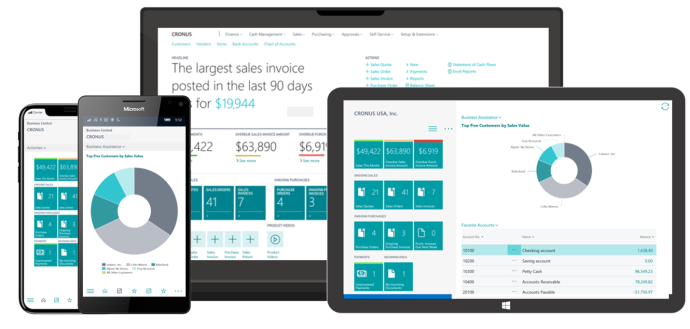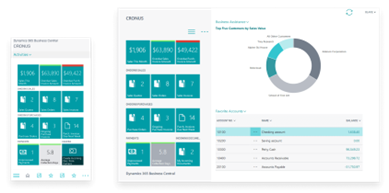
Organizations are turning to technology more and more to enhance their operational efficiency, streamline processes, and stay ahead of their competition. Microsoft Dynamics 365 Business Central, a comprehensive enterprise resource planning (ERP) solution, offers a versatile platform that can be tailored to address specific business needs across various industries. Let’s look closer at how Dynamics 365 Business Central customizations can be configured to fit your unique business requirements, backed by real-world industry examples.
Customization is often a scary word, both to implementers and clients. Everyone sees dollar signs. But the point of our discussion today is how simple Business Central makes it to tailor the system to work the way you do, with minimal effort.
Understanding Microsoft Dynamics 365 Business Central
Microsoft Dynamics 365 Business Central is an all-in-one cloud-based ERP system designed to help businesses manage their financials, supply chain, sales, and customer service seamlessly. The system’s modular architecture and extensive customization options enable organizations to mold the platform to their specific needs while maintaining the core functionalities that make Business Central a powerful tool.
Dynamics 365 Business Central Customizations and Capabilities
1 . User Interface and Workflows: With Dynamics 365 Business Central customizations it allows you to tailor the user interface to match your business processes and create personalized dashboards. Workflows can be designed to automate routine tasks, reducing manual effort, and minimizing errors. For instance, in the manufacturing industry, custom workflows can be set up to optimize operations, enhance efficiency, and maintain high-quality standards. By automating key processes such as production planning, quality control, inventory management, vendor collaboration, change management, maintenance, and order fulfillment, manufacturing businesses can streamline their workflows, reduce manual errors, and focus on delivering exceptional products to customers. As manufacturing continues to evolve, embracing custom workflows becomes a strategic advantage in staying competitive and agile in the industry.
2 . Data Fields and Entities: Businesses often require unique data fields and entities to capture industry-specific information. Business Central’s customization tools permit the addition of custom fields to records. For example, in the healthcare sector, a hospital might need to track patient-specific data such as medical history and insurance details, which can be seamlessly integrated into the system. Not only does this help capture and store patient data, but custom fields and entities can help to enhance the patient experience with appointment management, tracking type of appointment, preferred doctors, specific visit reasons, and more.
3 . Reports and Analytics: In the realm of modern business, the ability to extract actionable insights from data is paramount. This is where Microsoft Dynamics 365 Business Central’s robust reporting capabilities truly shine. When it comes to sectors such as retail, these reporting functionalities take on a transformative role, revolutionizing the way businesses understand and interact with their customers, products, and overall operations.
In the retail industry, every transaction, every customer interaction, and every product movement generates a wealth of data. With Business Central’s add-on applications and customizable reporting tools, retailers can harness this data to gain a competitive edge. Customized sales reports offer a granular view of product performance, highlighting top-selling items, seasonal trends, and customer preferences. These insights empower retailers to make informed decisions about inventory stocking levels, pricing strategies, and promotional campaigns, resulting in optimized sales and revenue streams.
Furthermore, the integration of dashboards tailored to the retail sector provides a real-time snapshot of key performance indicators. Retailers can monitor metrics like inventory turnover rates, sales conversion rates, and customer acquisition costs at a glance. These visual representations enable quick identification of operational bottlenecks, opportunities for improvement, and trends that might otherwise go unnoticed.
Customer loyalty programs play a pivotal role in retail, and with Business Central’s analytics capabilities, retailers can gain a deeper understanding of customer behavior and preferences. By analyzing customer data, including purchase history, frequency of visits, and engagement with loyalty programs, businesses can tailor marketing efforts to specific customer segments. This personalized approach enhances customer satisfaction, fosters brand loyalty, and drives repeat business.
Predictive forecasting is another game-changing aspect of Business Central’s analytics prowess. By leveraging historical data and employing sophisticated algorithms, retailers can anticipate future demand patterns, optimize inventory levels, and minimize excess stock or stockouts. This proactive approach not only streamlines operations but also enhances customer satisfaction by ensuring products are readily available when needed.
Marketing strategies also benefit significantly from the insights derived through Business Central’s analytics. By analyzing customer purchasing behavior, retailers can tailor marketing campaigns to target specific demographics, promote relevant products, and optimize the timing of promotions. This data-driven approach enhances marketing ROI and fosters a more engaging and meaningful customer experience.
4 . Integration with Third-party Solutions: Many industries rely on specialized software that complements their operations. Business Central’s APIs and integration capabilities make it possible to connect with third-party applications. Thousands of these add-on applications are available in the AppSource store, for any industry and in categories from AI and machine learning to Marketing, Sales, Finance, and Compliance.

In the logistics industry, for example, a shipping company can integrate tracking information from carrier services (e.g., FedEx, UPS) directly into Business Central, providing real-time visibility into shipments, giving customers timely delivery updates.
Online retail businesses can integrate Business Central easily with their e-commerce platform (e.g., Shopify, WooCommerce) to synchronize product information, inventory levels, and stock levels. This ensures accurate stock management and timely order fulfillment.
Financial institutions also find integrations beneficial. By integrating their core banking systems, financial companies can streamline loan application processing and credit assessment, all while ensuring that their customer financial data is secure and accurately transferred between systems.
Talk to our Dynamics experts today and learn more about the robust platform of Microsoft Dynamics 365 Business Central, which can be tailored to meet the unique requirements of your business. Its extensive configuration and customization capabilities empower organizations to adapt the ERP system to specific business processes, enhancing operational efficiency and driving growth. By embracing user-driven tailoring, businesses can simplify operations, improve customer satisfaction, and stay ahead in today’s competitive market.
If you’re considering an upgrade or a new ERP solution for your business, we can help you find the best fit. Contact CAL Business Solutions today for more information.
By CAL Business Solutions, Inc., Acumatica and Microsoft Dynamics GP/ 365 BC Partner www.calszone.com
















